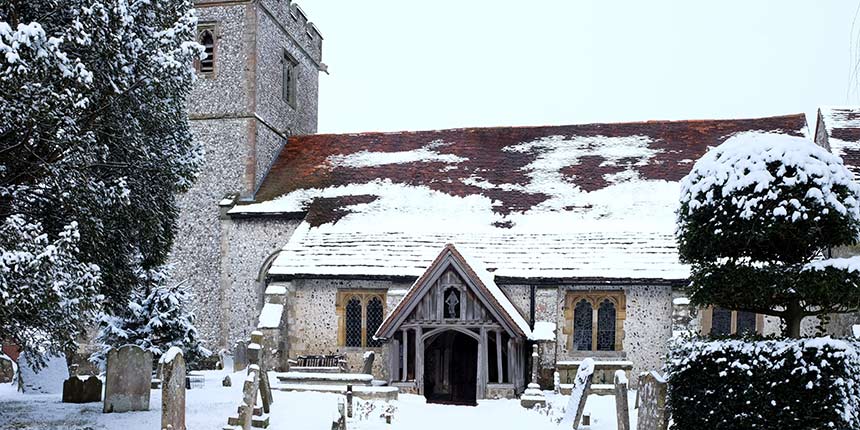Cold weather advice for churches
03 January 2023
The onset of cold weather will bring the usual related problems for churches and associated properties. This risk guidance offers you practical advice for some of the most common issues.

Burst pipes
Just a small fracture in a pipe can release many litres of water, damaging masonry and plaster, carpets and other contents.
The chance of suffering these losses can be reduced by following a few simple steps:
- Ensure water pipes are well lagged
- Make sure the boiler and heating system is serviced regularly and check that the frost thermostat is working correctly
- Make sure you know where to turn off the water supply.
If you discover a frozen pipe, don’t wait for it to burst. Turn off your water supply and then slowly thaw the affected pipe by introducing gentle heat to the area eg by using a hairdryer, space heater or hot water bottle. Do not attempt to thaw the pipe with a blow torch or other open flame.
If the worst happens and you do have a burst pipe, turn off the water supply at the stopcock and try to catch any excess water in a bucket or other container. Do not use any electrics if you believe they may have been affected by the escaping water. You will need to have these checked by a professional electrician.
Keeping gutters, gullies and drains clear
Autumn brings with it fallen leaves which fill gutters. Those gutters have downpipes which only work if they are clear of obstruction. Inevitably if they are not removed, blockages will occur and the accumulation of water will eventually cause damage. Additionally, if there is a blockage in a downpipe, any trapped rainwater may crack or shatter the downpipe if it freezes.
Please remember to add to your list of jobs checking your valleys, gutters, hoppers and downpipes for blockages so that they can carry water away quickly and efficiently. Signs of soil being washed away at ground level or splashes of soil at the base of walls can be an indication that water is not being caught by the gutter.
If blockages are identified, please arrange for a local contractor who is able to work safely at height to clear the problem.
Keeping an eye on your roof
You have a duty of care to ensure that any visitors are safe.
Unfortunately, slips and trips can happen, particularly when there is ice and snow on the ground. You should take actions that are ‘reasonable in the circumstances’. This can include ensuring that entry and exit routes are kept free of anything which may cause a person to slip and taking preventative measures, such as clearing and gritting paths.
It is not necessary to ensure that each and every available path is immediately cleared, as long as there is one safe route available to access the building.
Clearly, the timing and extent of any snow fall is relevant. While it might not be reasonable for paths to be cleared during heavy falls of snow, the longer the snow and ice remain on the ground after the fall has ceased, the greater the likelihood of it being considered reasonable for some attempt to be made to clear it.
Temporary heating
Should your main church heating system fail during the winter months, we recommend that electric convector or fan-assisted heaters with thermostatic cut-outs (that operate in the event of over-heating) are used as a temporary measure.
Liquid petroleum gas (LPG) heaters give off lots of water vapour which can have an adverse effect on the building, and can lead to the onset of rot in woodwork. If they are used, gas cylinders should be kept to a minimum and preferably changed in the open air or in a well ventilated area away from any source of ignition.
Electric radiant heaters and paraffin/oil fired heaters should never be used, even as a temporary measure.
Portable heaters should be sited well clear of woodwork or other combustible materials, and where possible, protected against the possibility of being knocked over or moved accidentally by the fitting of guards.
Temporary heaters should not be left unattended for long periods or used when the building is unoccupied, and should never be moved once they have been switched on.
If the church is unoccupied
- Keep your church heated to reduce the chance of a pipe freezing
- If the church is going to be unoccupied for a period, drain down and shut off your water system
- Ask somebody to check on the church daily. This may not prevent a loss but early identification of an escape can help reduce the ultimate cost
- Ensure you have complied with any unoccupancy conditions or warranties listed in your policy. If you need any clarification, call us on 01 619 300